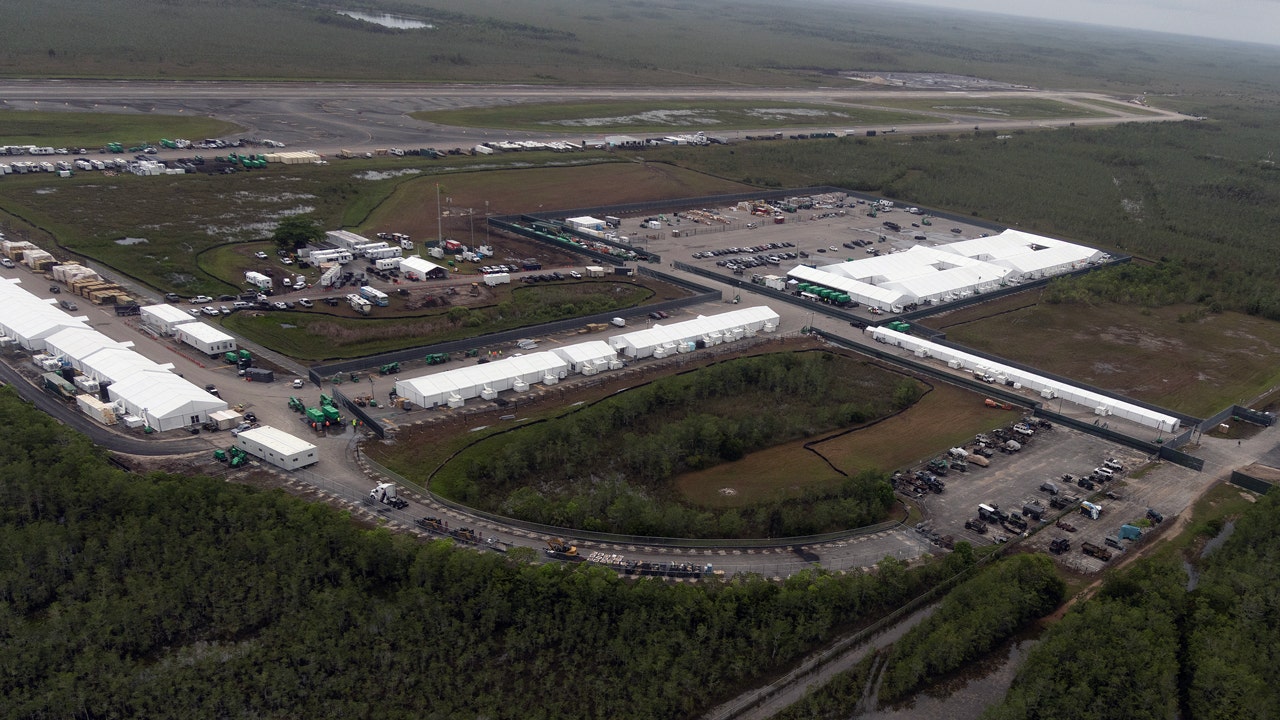Federal Judge Blocks Expansion of Florida’s ‘Alligator Alcatraz,’ Orders Partial Shutdown
Miami, FL – August 22, 2025 – A federal judge has dealt a significant blow to Florida’s controversial immigration detention center, dubbed “Alligator Alcatraz,” by issuing a preliminary injunction on Thursday, August 21, 2025, that halts its expansion and orders the state to scale down operations within 60 days. U.S. District Judge Kathleen M. Williams, in an 82-page ruling, barred the state and federal governments from bringing new detainees to the facility, located at the Dade-Collier Training and Transition Airport in the Florida Everglades, and mandated the removal of generators, gas, sewage, lighting, fencing, and other infrastructure. The decision, celebrated by environmentalists and the Miccosukee Tribe, cites violations of the National Environmental Policy Act (NEPA) and risks to the fragile Everglades ecosystem.
A Legal Victory for Environmentalists
The ruling follows a lawsuit filed in June 2025 by environmental groups, including Friends of the Everglades and the Center for Biological Diversity, alongside the Miccosukee Tribe, who argued that the rapid construction of the facility violated NEPA by bypassing required environmental impact studies. Judge Williams, appointed by former President Barack Obama, found that the detention center, built to house up to 3,000 federal immigration detainees, was a joint state-federal project subject to federal environmental laws. She wrote, “If it walks like a duck, quacks like a duck, and looks like a duck, then it’s a duck,” emphasizing that federal involvement in immigration enforcement triggered NEPA requirements.
The facility, constructed in weeks on a largely abandoned airfield in Ochopee, Florida, has been criticized for its environmental impact, including 800,000 square feet of new paving that causes runoff into tribal lands and bright lighting disrupting endangered species like the Florida bonneted bat and panther. Williams’ order prohibits new construction, such as tents or industrial lighting, and requires the removal of temporary infrastructure, rendering the site potentially uninhabitable within nine weeks. Existing detainees can remain, but no new ones can be admitted, raising questions about the facility’s long-term viability.
Political and Legal Backlash
Florida Governor Ron DeSantis and the Trump administration, key proponents of “Alligator Alcatraz,” vowed to appeal. DeSantis, who has championed the facility as a tool for mass deportations, called the ruling predictable, stating on X, “The fix was in… We expected an adverse ruling and will immediately appeal to get this stayed.” Jeremy Redfern, a spokesperson for Florida Attorney General James Uthmeier, criticized Williams, noting that another judge in the Southern District of Florida recently deemed it the wrong venue for related lawsuits, as the facility lies in Collier County under the Middle District’s jurisdiction. “Once again, she oversteps her authority, and we will fight this unlawful decision,” Redfern said.
The Trump administration, which has touted the facility as a model for nationwide deportation efforts, downplayed environmental concerns. A Department of Homeland Security spokesperson argued the land was already developed, calling the lawsuit an attempt to obstruct President Trump’s immigration agenda. However, plaintiffs’ attorney Paul Schwiep countered, “The suggestion there is no environmental impact is absurd,” highlighting the facility’s proximity to the Big Cypress National Preserve and Miccosukee tribal lands.
Broader Implications
The ruling is a setback for Florida’s aggressive immigration enforcement strategy, which includes plans for a second detention center, the “Deportation Depot,” at a National Guard training site in north Florida. Environmentalists, led by Eve Samples of Friends of the Everglades, hailed the decision as a step toward protecting the Everglades, with Samples stating, “We’re pleased the judge saw the urgent need to protect this imperiled ecosystem.” The Miccosukee Tribe, whose sacred lands are affected, emphasized their lack of prior notice about the project, despite legal obligations.
The facility, operational since July 2025 after a high-profile visit by President Trump and Governor DeSantis, has faced additional scrutiny. A separate lawsuit alleges inhumane conditions, including cage-like units, mosquito infestations, and limited legal access for detainees, with a hearing scheduled for late September. These legal challenges highlight tensions between immigration policy and environmental and human rights concerns.
What’s Next?
Williams’ injunction is preliminary, meaning the case will continue to be litigated, but it sets a strong precedent for enforcing environmental reviews. Florida’s appeal could delay implementation, though temporary restraining orders are typically not appealable. The state faces logistical challenges in relocating hundreds of detainees within 60 days, potentially costing millions. Meanwhile, the ruling fuels national debates over immigration enforcement, with X posts reflecting polarized views: some praise the environmental focus, while others, like user @EricLDaugh, call it “MASSIVE overreach” and urge continued construction.
As the legal battle unfolds, “Alligator Alcatraz” remains a flashpoint in the intersection of immigration, environmental policy, and federal-state authority, with implications for similar projects nationwide.
